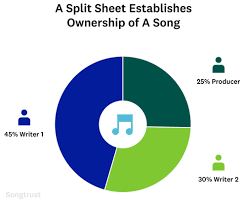If you’re sharing your music with other creators and collaborators, you’ll need to look into split sheets. It protects all of you, and your work.
If you’ve ever written a song with other people, whether it’s bandmates, a producer, or a fellow songwriter, you’ve probably heard about “split sheets.” But what exactly are they? Why do you need one? Let’s break it down in simple terms.
What is a split sheet?
A split sheet is a document that details how a song’s ownership is divided among everyone who helped create it. Think of it as a way to make sure everyone involved in making the song gets credit. More importantly, gets paid when the song earns money.
Every time a song is played on the radio, streamed on platforms like Spotify, or licensed for TV shows and movies, it generates income. The split sheet makes sure everyone involved gets their fair share of this income based on how much they contributed to the song.
Why do you need a split sheet?
To avoid confusion and disputes
- When a song becomes successful, money starts coming in. Without a split sheet, there can be disagreements about who deserves what percentage of the earnings. By filling out a split sheet right after the song is written, everyone agrees on their share upfront, avoiding arguments later on.
To make sure everyone gets paid
- Different organisations and platforms that pay out royalties (like ASCAP, BMI, or music distributors) need to know who to send the money to. A split sheet ensures everyone’s name and their share is officially recorded. Making it easier for those organisations to distribute the payments correctly.
To protect your rights
- A split sheet is a legal document. In case there’s ever a dispute or confusion about ownership of the song, this document can be used to prove who owns what part of the song. It protects you and your rights as a creator.
What should be included in a split sheet?
A basic split sheet should include the following information:
- The song title: The name of the song everyone worked on.
- The names of all contributors: Include the full names of everyone who contributed to the song. This can be songwriters, producers, and sometimes even session musicians (if they made a creative contribution).
- The percentage splits: Each person’s share of the song. For example, if two people wrote a song together equally, they might each get 50%. If there were more contributors, the percentages might be split differently (e.g., 40% for the main writer, 30% for the producer, and 15% each for two co-writers).
- Signatures: Everyone involved should sign the split sheet to confirm they agree to the percentages listed.
How are the percentages decided?
The percentages on a split sheet are usually based on how much each person contributed to the creation of the song. For example:
- Songwriters: The people who wrote the lyrics or the melody usually get a significant share.
- Producers: If the producer helped create the instrumental, beats, or arrangement, they’ll usually receive a share.
- Session musicians: In some cases, musicians who played a creative role in shaping the final version of the song might get a small percentage.
There’s no universal rule for how splits are decided. It’s up to the people involved to agree on what feels fair. That’s why it’s important to have an open conversation about it right after the song is written, so everyone’s on the same page.
When should you fill out a split sheet?
The best time to fill out a split sheet is as soon as the song is finished. While it might feel awkward to talk about money and percentages right after a creative session, it’s better to handle it right away. The longer you wait, the harder it can be to remember who contributed what, and potential disagreements could arise.
Do I need a lawyer for a split sheet?
You don’t necessarily need a lawyer to create a split sheet. It’s a straightforward document that you and your collaborators can fill out yourselves. However, if there’s a lot of money or high stakes involved (for example, if you’re working with big-name artists or producers), it might be a good idea to consult a lawyer to make sure everything is clear and legally sound.
What happens without a split sheet?
Without a split sheet, things can get messy. For example:
- Disputes over ownership: If the song starts making money and there’s no record of who owns what percentage, there can be serious arguments about who deserves what share.
- Delayed payments: Royalties can be held up if the proper organisations don’t have the right information about how to distribute them.
- Lost income: In worst-case scenarios, some contributors might not get paid at all because there’s no official record showing they had a part in creating the song.
In the music world, things can move fast. It’s easy to get caught up in the excitement of making music and forget about the business side. But by filling out a split sheet, you’re protecting both your work and your relationships with your collaborators. It ensures that everyone gets the credit and payment they deserve.




